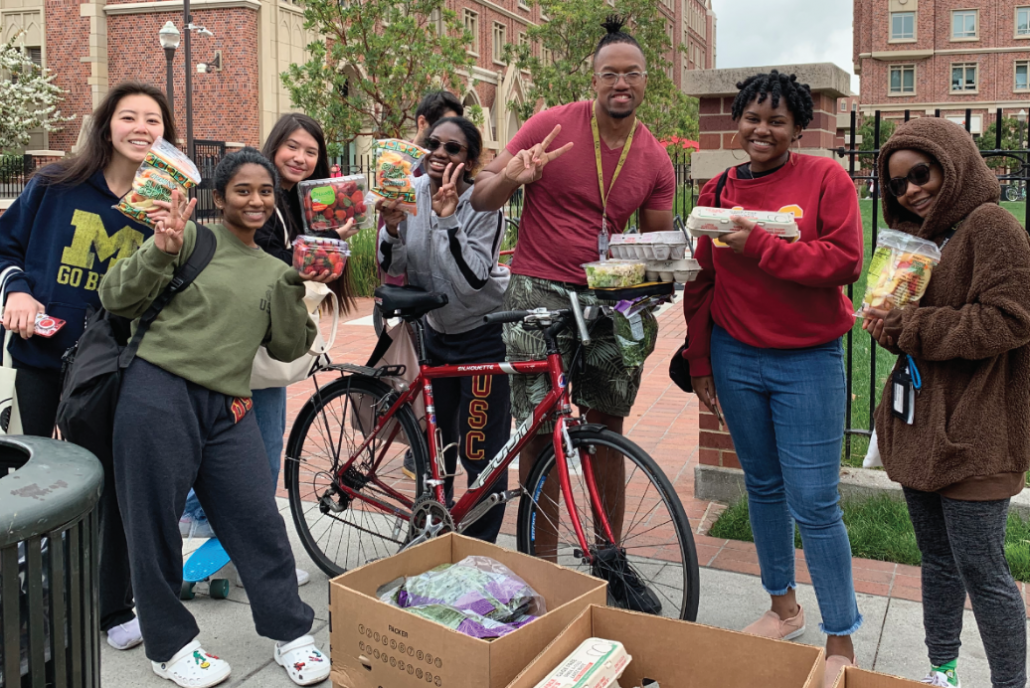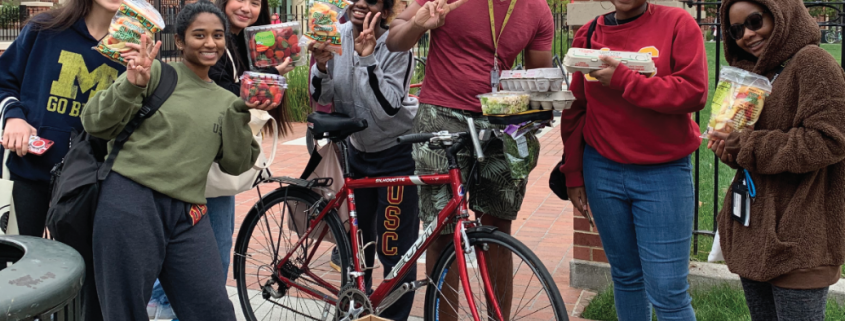Student group relaunches drives for recovered food

After four years of inactivity, the Food Recovery Network of USC relaunched its food distribution drives earlier this month. The organization conducts food runs across the greater Los Angeles area on Sundays to gather surplus food from local markets and grocers. Student volunteers then redistribute more than 100 pounds of fresh produce and nonperishable items directly to students with limited access to healthy food.
The organization was revived by Kyra Chan, a sophomore majoring in public policy, who wanted to address food insecurity on campus by providing fresh produce to students in need and share affordable healthy eating practices. Food Recovery Network works on a nationwide scale to eliminate food waste on college campuses through its redistribution efforts.
Inspired by her passion for both food and public policy, Chan said she looked for on-campus food insecurity organizations to become involved in and came across the history of the dormant Food Recovery Network. Chan said she wanted to prioritize fresh produce and healthy meal options, so she altered the national program’s mission to confront the inaccessibility of healthy food that USC students face in the midst of the South L.A. food desert.
“People can get food, that’s not the problem,” Chan said. “People can’t get nutritious, healthy, affordable food. That’s the problem. That’s why my approach to the Food Recovery Network is specifically recovering from Trader Joe’s, Whole Foods, farmers markets, straight-up farms, because that’s where the [need] is.”
Forty-five percent of college student respondents faced food insecurity in the prior 30 days, according to an April survey conducted by Temple University’s Hope Center for College, Community and Justice.
In addition to the weekly food distributions on Sundays, the group hosts biweekly Meal Prep Mondays where they aim to teach students efficient and affordable cooking skills and provide attendees with nutritious and cheap recipes based on a CalFresh Electronic Benefit Transfer budget, a monthly benefits program that helps low-income students and households purchase sufficient food.
“[We host meal preps] to teach them how to cook really easy, really simple, quick meals but also to make them very affordable to the lowest income,” Chan said. “We use [a CalFresh EBT] budget to base our meals off of so that whoever wants to mimic this recipe, no matter where you are on the income levels, you can afford what we’re doing.”
As a new volunteer for the organization, William Gonzalez said he appreciated the effort to keep the meals in an affordable price range for students.
“I hope people can learn how to cook … and also budget-mindedness,” said Gonzalez, a sophomore majoring in environmental studies. “You want to make sure you have a healthy diet and then how to balance that with the amount of money you may have.”

The Food Recovery Network of USC focuses mainly on spreading awareness about food insecurity on campus, Chan said. To expand resources for students, they specifically focus on providing access on Sunday when other organizations may not be available.
“[L.A. has] a population that has the most individuals eligible for CalFresh, but we actually have the lowest application rate for it because a lot of people just simply don’t know that they are eligible,” Chan said.
In addition to providing resources, Food Recovery Network creates a safe space for students who face food insecurity, such as Ruben Romeo, who said Food Recovery Network creates a space of belonging and solidarity on campus.
“I personally think it’s nice that there’s a space where people who are going through the same adversities can come together,” said Romeo, a junior majoring in health promotion and disease prevention studies.
With support and advertising from Undergraduate Student Government, Food Recovery Network can reach all USC students in need that might be unaware of the resources available to them on campus, said Romeo, who was recently appointed to USG Senate.
“If they can get the support that they deserve, it can be so much more in the sense of actual publicized, facilitated workshops on cooking and how to maintain a healthy nutritional intake throughout USC,” he said. “I hope that they can get the resources to kind of increase their powerhouse behind advertising.”
Although the organization was re-established this semester, Chan said she is excited to see how popular the food drives have been and looks toward increasing the volume of food she can distribute in the future once the organization grows.
“I’m already starting to see familiar faces, which means that there [are] certain students that need this every week, and I want to make sure I can do that for them,” Chan said.

